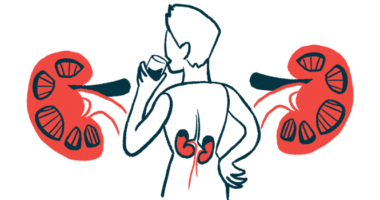In EGPA, Fasenra outperforms Nucala at reducing steroid use
Phase 3 MANDARA trial compared the 2 treatments in 140 adults

Fasenra (benralizumab), which is approved for a rare type of asthma, and Nucala (mepolizumab) were similarly effective at inducing remission in eosinophilic granulomatosis with polyangiitis (EGPA), but more people on Fasenra were able to stop using oral corticosteroids (OCS), with fewer monthly injections.
That’s according to final published data from the year-long Phase 3 MANDARA clinical trial (NCT04157348), which compared AstraZeneca’s therapy against the only EGPA approved treatment as add-ons to OCS. The findings were presented at the American Academy of Allergy Asthma & Immunology Annual Meeting.
“There is a high unmet medical need in … [EGPA] as there are limited treatment options and not all patients respond to currently available treatments,” Michael Wechsler, MD, the international coordinating investigator of the MANDARA trial, told ANCA Vasculitis News in an email. “Having another treatment option that could help patients achieve remission and reduce chronic OCS usage could alleviate some of the impact of this debilitating disease.” Wechsler is a professor of medicine and director of The Asthma Institute at National Jewish Health and the study’s first author.
The AstraZeneca-funded study, “Benralizumab versus Mepolizumab for Eosinophilic Granulomatosis with Polyangiitis,” was published in The New England Journal of Medicine.
In EGPA, a rare type of ANCA-associated vasculitis, small clumps of inflammatory cells made up mostly of an immune cell called eosinophils help drive damage and inflammation to small blood vessels. All EGPA patients have very high eosinophil levels at some point in their disease course and around half have severe eosinophil-related (eosinophilic) asthma, according to AstraZeneca.
Oral corticosteroids, which ease inflammation and prevent immune-related damage, are a mainstay treatment, but long-term use can result in side effects. Plus, patients often have “recurrent relapses when attempting to taper off these treatments,” Wechsler said.
Fasenra and Nucala go head to head
Fasenra is an antibody-based therapy approved in the U.S. and other countries as an add-on treatment for eosinophilic asthma. Administered via injections under the skin, it suppresses eosinophil growth and survival by blocking IL-5 receptor, a protein on the cells’ surface. Its mechanism of action and administration route is similar to Nucala, the only approved EGPA therapy, but requires fewer injections, which is expected to make it a more convenient option.
MANDARA was a head-to-head Phase 3 trial that compared Fasenra to Nucala among 140 adults with difficult to treat EGPA who were receiving oral corticosteroids, with or without stable immunosuppressive treatment.
The participants were randomly assigned to either a single injection of Fasenra (30 mg) or three injections of Nucala (100 mg each) once a month for a year while tapering off OCS.
The trial’s main goal was to establish that Fasenra was not inferior to Nucala at inducing disease remission at both eight and 11 months of treatment. Disease remission was defined as a Birmingham Vasculitis Activity Score of 0 and an OCS dose equal to 4 mg/day or less.
This goal was met, with 59% of Fasenra-treated patients and 56% on Nucala achieving remission at both timepoints.
Remission duration and relapse rates were similar between the groups. A total of 42% of patients on Fasenra and 36% on Nucala achieved remission within the first six months of treatment and remained there through a year. In either group, about 30% of patients had a relapse.
“The results from this trial are an important step forward for the EGPA community, as this is the first trial to demonstrate that remission from EGPA with an eosinophil-targeting biologic is achievable for the majority of patients,” Sharon Barr, executive vice president of BioPharmaceuticals R&D at AstraZeneca, said in a company press release.
Reduced corticosteroid dose with Fasenra
In the last month of treatment, 86% of Fasenra-treated patients and 74% on Nucala achieved at least a 50% reduction in corticosteroid dose. Moreover, a higher proportion of Fasenra-treated patients were able to fully taper off OCS that month over the Nucala group (41% vs. 26%).
“Though further studies are needed, our results indicate that eliminating oral glucocorticoids may now be an achievable treatment goal while using eosinophil-targeted drugs for EGPA,” Wechsler said in a separate press release.
Fasenra also led to greater reductions in blood eosinophil counts, starting as early as the first week and sustained throughout a year of treatment.
Fasenra “did a better job in reducing the need of oral glucocorticoids and lower blood eosinophil counts,” Wechsler said. “This was achieved using fewer injections … which also could be a benefit to the patient.”
The therapy was well tolerated, with no new safety signals identified.
All the patients completing the placebo-controlled phase were eligible to move to the open-label extension, where all are receiving Fasenra for at least a year.
“Recognizing the daily challenges faced by the patient communities living with inflammatory disorders like EGPA, pioneering research such as MANDARA aims to redefine patient care and bridge gaps in understanding for a better quality of life,” Wechsler said. “By connecting the significance of eosinophilic inflammation to EGPA, AstraZeneca’s research has the potential to transform standards of care for patients with this complex condition.”







